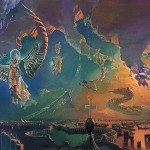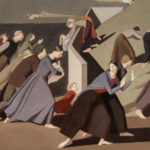We run our website the way we wished the whole internet worked: we provide high quality original content with no ads. We are funded solely by your direct support. Please consider supporting this project.
Old Testament Support for the Warfare Worldview
Rebuking Hostile Waters
Satan plays a minor role in the Old Testament relative to the New Testament. Instead, the warfare worldview in the Old Testament is expressed in terms of God’s conflict with hostile waters, cosmic monsters, and other gods.Like their Ancient Near Eastern neighbors, ancient Jews believed that the earth was founded upon and encircled by water (e.g. Ps. 104:2–3, 5), and they often depicted these waters as a chaotic or hostile force. Whereas other cultures credited one of their chief god(s) with preserving order against hostile forces of chaos, biblical authors always acknowledge Yahweh as earth’s defender. (1) Yahweh’s “rebuke” causes the hostile waters to “flee.” It is “at the sound of [his] thunder” that “they take to flight” (Ps. 104:7). Indeed, these hostile waters take flight at the very sight of God (Ps. 77:16). The Lord assigns rebel waters a “boundary that they may not pass…” (v. 9, cf. Prov. 8:27–29; Job 38:6–11). It is the Lord and none other who defeats these enemies, who tramples on the sea with his warring horses (Hab. 3:15), and who sits enthroned above “the mighty waters” (Ps. 29:3–4, 10).
Biblical authors are confident that the Lord is capable of containing and ultimately defeating these rebel waters. But there is no suggestion here that Yahweh’s war against these forces is prescripted or inauthentic. To the contrary, as a number of exegetes have noted, biblical authors exalt God’s sovereignty precisely because they are certain that these raging forces are real, formidable foes. (2)
Defeating cosmic monsters: Leviathan and Rahab
Ancient Hebrew authors also expressed the Creator’s warfare against cosmic monsters such as Leviathan and Rahab. In Ancient Near Eastern mythology, Leviathan was a ferocious sea serpent encircling the earth. He had many heads (Ps. 74:14) and could blow smoke out of his nose(s) and fire out of his mouth(s) (Job 41:18–21). Humans could not defeat or control this powerful beast, for their weapons were useless against it. Indeed, this monster could eat iron like straw and crush bronze as if it were decayed timber (Job 41:26–27). Nevertheless, biblical authors were confident that Leviathan was no match for Yahweh. At the time of creation as well as in subsequent battles against Israel’s enemies, Yahweh “crushed the heads of the dragons in the waters [and] crushed the heads of Leviathan” (Ps. 74:14). In looking forward to God’s ultimate victory that will free creation from evil, Isaiah writes: “On that day the LORD with his cruel and great and strong sword will punish Leviathan the fleeing serpent, Leviathan the twisting serpent, and he will kill the dragon that is in the sea” (Isa. 27:1). (3)
Rahab also inhabited the waters that encircle the earth and threatened the world but was no match for Yahweh. When Yahweh expressed his wrath against evil, “the helpers of Rahab bowed beneath him” (Job 9:13). In the primordial past Yahweh’s power “churned up the sea,” his wisdom “cut Rahab to pieces,” and his hand “pierced the gliding serpent” (Job 26:12–13). The Psalmist also celebrated Yahweh’s sovereignty over “the raging sea” by announcing that he had “crushed Rahab like a carcass” and “scattered [his] enemies with [his] mighty arm” (Ps. 89:9–10). In similar fashion Isaiah reassured himself that Yahweh would “awake” to deliver Israel by remembering that in the primal past he had “cut Rahab to pieces” and “pierced the dragon” (Isa. 51:9).
Contrary to the convictions of most contemporary western people, but in keeping with the basic assumptions of ancient people and primordial people groups today, Old Testament authors did not make a sharp distinction between “spiritual” and “physical” realities. The world “above” and the world “below” were seen as intertwined. Hence biblical authors frequently see battles between nations as participating in God’s on-going battle with cosmic forces. For example, the evil character and threatening power of Rahab on a cosmic level was understood to be revealed in and channeled through the nation of Egypt (Ps. 87:4; Isa. 30:7; cf. Ezek. 29:3; 32:2; Jere. 51:34).
Thus, when Israel defeated an opponent this was sometimes construed as the Lord once again defeating cosmic forces of chaos (Isa. 17:12–14). When Yahweh freed the children of Israel from Egypt, for example, this was considered his defeat of the raging waters (Hab. 3:12–13, cf. Nah. 1:4). (4) And when he further delivered Israel by parting the Red Sea, this was seen as a new application of Yahweh’s victory over Rahab (Isa. 51:9–10; Ps. 77:16). (5) Conversely, when Israel was conquered by an enemy this could be described as being devoured by the mighty sea serpent (Jere. 51:34, cf. v. 55). Similarly, David identified the enemies who opposed him as the forces that have opposed God since the beginning of creation (Ps. 93:3–4). Consequently, when his life was threatened he asked the Lord to reenact his primordial victory over sinister cosmic forces on his behalf. He called upon Yahweh to deliver him “from my enemies and from the deep waters. Do not let the flood sweep over me, or the deep swallow me up” (Ps. 69:14–15). And again, “Stretch out your hand…set me free and rescue me from the mighty waters, from the hand of aliens” (144:7).
Battling the “gods”
Beyond cosmic waters and monsters, Old Testament authors also assumed the existence of multitudes of other powerful heavenly beings called “gods,” the “sons of God,” or less frequently, “angels.” Together they formed a “heavenly council” in which decisions that affected humans were made (1 Kings 22:20; Job 1:6; 2:1; Ps. 82:1; 89:7). They were supposed to carry out God’s will and fight on God’s behalf (Ps. 34:7, 68:17; 82; 103:20; 2 Kings 2:11, 6:16–17; 2 Sam. 5:23–24; Dan. 7:10). For our purposes the most significant aspect of these gods, however, is that they were considered personal agents who exercised a significant influence on the flow of history and who did not necessarily carry out Yahweh’s will. Because they were personal agents, they could choose to oppose God’s will. And sometimes they did.
For example, in opposition to God’s will, some of these “sons of God” copulated with human women and produced hybrid giants in the days prior to the flood (Gen. 6:1–4). In the book of Daniel a “prince of Persia” opposed God’s will by delaying his response to one of Daniel’s prayers (Dan 10). The Lord had to send another powerful angel to battle this “prince” in order to get the message through. Along similar lines, a national god named Chemosh was apparently able to route Israel on behalf of the Moabites as a result of the king of Moab sacrificing his son (2 Kings 3:21–22). (6) Indeed, a case can be made that all the “gods of the nations” were originally servants of God assigned to care for particular nations. But instead of using their position to lead the nations to Yahweh, they made themselves the object of the nation’s allegiance. (7)
Psalm 82 describes the personal nature of these beings as well as their significant influence over what transpires on earth:
“God has taken his place in the divine council;
in the midst of the gods he holds judgment:
‘How long will you judge unjustly
and show partiality to the wicked?
Give justice to the weak and the orphan;
maintain the right of the lowly and the destitute.
Rescue the weak and the needy;
deliver them from the hand of the wicked…’
I say ‘You are gods,
children of the Most High, all of you:
nevertheless, you shall die like mortals,
and fall like any prince.’” (Ps. 82:1–7)
This passage depicts a discussion that transpired in the “heavenly council.” These gods (perhaps national gods) had apparently been given various duties to perform among humans: to help administer justice, to defend the weak, and to help the poor. But at least some of these gods had rebelled and decided to serve the wicked instead. Consequently, Yahweh threatened them with the same fate that befalls mortals and earthly princes. Though they were truly gods, if they didn’t conform to his will, they would die like the mortals they were supposed to protect.
Old Testament authors did not assume that things always went according to God’s plan in the heavenly realm any more than they went according to his plan on earth. While the Lord always accomplishes his general will in the end, there is often significant opposition along the way.
End Notes
(1) According to J. Levenson, “the Sea [is] a somewhat sinister force that, left to its own, would submerge the world and forestall the ordered reality we call creation. What prevents this frightening possibility is the mastery of YHWH, whose blast and thunder…force the Sea into its proper place,” Creation and the Persistence of Evil: The Jewish Drama of Divine Omnipotence (San Francisco: Harper and Row, 1988), 22.
(2) Levenson, Persistence of Evil; J. Gray, The Biblical Doctrine of the Reign of God (Edinburgh: T&T Clark, 1979); A. Konig, Here Am I: A Believer’s Reflection on God (Grand Rapids, MI: Eerdmans, 1982); idem., New and Greater Things: Re-evaluating the Biblical Message on Creation (Pretoria: University of South Africa, 1988); C. J. Labuschagne, The Incomparability of Yahweh in the Old Testament, POS 5. (Leiden: E. J. Brill, 1966); T. Longman and D. G. Reid, God is a Warrior (Grand Rapids: Zondervan, 1995); T. N. D. Mettinger, “Fighting the Powers of Chaos and Hell—Towards the Biblical Portrait of God,” Studia Theologica 39 (1985): 21–38.
(3) The same vision of Leviathan and his ultimate defeat is expressed in Revelation 12 which speaks of the “great red dragon, with seven heads” who is “the deceiver of the whole world” (Rev 12:3, 9). This “great dragon” is explicitly identified as “the Devil and Satan” (v. 9)
(4) A. Yarbro Collins, The Combat Myth in the Book of Revelation, HDR 9 (Missoula, MT: Scholars Press, 1976), 11.
(5) Ibid., 117, See also Levenson, Persistence of Evil, 20–21.
(6) Cf. Judges 11:24 which seems to assume that Chemosh was able to acquire land for the Moabites through battle.
(7) On angelic beings as “gods of the nations,” see Boyd, God at War, 135–40. For further discussions see D. I. Block, The Gods of the Nations: Studies in Ancient Near Eastern National Theology, ETSMS 2 (Jackson, MS: Evangelical Theological Society, 1988); W. Wink, Unmasking the Powers: The Invisible Forces that Determine Human Existence (Philadelphia: Fortress, 1986), 87–107.
Further Reading
G. Boyd, God at War (IVP, 1997).
Category: Essays
Tags: Bible, Essay, Old Testament, Spiritual Warfare, Warfare Worldview
Topics: Spiritual Warfare, Cosmic Conflict
Related Reading

Do Angels and Demons Really Exist?
While the supremacy of God is never qualified in the Bible, this supremacy is not strictly autocratic. Other “gods” or spiritual entities like angels and demons are not mere puppets of the God of the Bible. Rather, they appear to be personal beings who not only take orders but also are invited to give input…

Finding Christ Behind the “Letter” That Kills
“The letter kills, but the Spirit gives life” Paul (2 Cor. 3:6) The Odd Way NT Authors Use the OT Have you ever noticed the rather strange way authors in the NT tend to use OT citations? Whereas most western Christians today stress the importance of seeking the “original intended meaning” of a passage, the…

Is Your Church Promoting Tribalism?
It’s long been said that Sunday morning is the most segregated time of the week. Sadly, many have taught us that homogeneity is the way the church grows the fastest. But should we put up with this? In what follows, Greg lays out a biblical foundation for what he calls “reversing Babel.” According to the…

The Victory is Already Won, But Not Yet
Christ came “to destroy the works of the devil” (1 John 3:8), to disarm “the rulers and authorities” (Col 2:15), and to “destroy the one who has the power of death, that is, the devil (Heb 2:14). The result of this victory is that he is seated on his rightful throne, the whole cosmos is…

God’s Way of War
As Judah was facing impending doom, the Lord told Hosea that he would save them “not by bow, sword or battle, or by horses and horsemen, but by the LORD their God” (Hos 1:7). So too, through the Psalmist the Lord encourages his people by saying: …

The Case For Believer’s Baptism
In this essay I briefly present my reasons for believing that baptism is intended only for people who are old enough to responsibly choose to become disciples of Jesus. I will first offer several biblical arguments, then offer a supporting argument and conclude by responding to several objects to believer’s baptism. Biblical Arguments Baptism…
